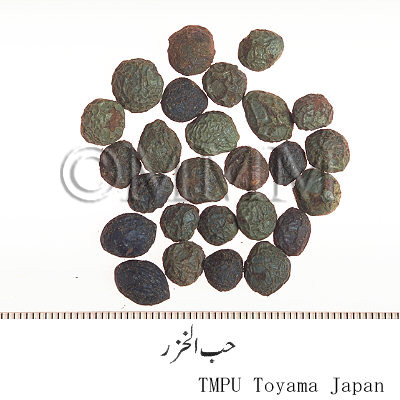Crude drug sample data base
※Click on the image to enlarge it.
The capital city, provincial capital city or the representative
location of its administrative area is indicated.
location of its administrative area is indicated.
Production area information
https://ethmed.toyama-wakan.net/img/pin_san.png
25.0700428
67.2847875
Collection information
Islamic Republic of Pakistan,Karachi [Karachi], Sind
https://ethmed.toyama-wakan.net/img/pin_nyu.png
Scientific information data base
| Crude drug name | Urudu name, English name | Habb al-khazra, Terebinth | ||
|---|---|---|---|---|
| Arabic name / Persian name | Habb al-khazra / Habb al-khazra | |||
| crude drug image |
| |||
| Original plant name | Pistacia mutica Fisch and Mey. syn. Pistacia terebinthus var. mutica Aitch. | |||
| Family name | Anacardiaceae | |||
| Used part | Seeds | |||
| Distribution area | Not found in India. | |||
| Description | It is well known as it grows in various cold countries including the island of Fuflawis. The seed, obtained from the plants of this island, are superior and have a bluish white colour resembling the glass. These seeds have a good fragrance. Its fruit is astringent in property similar to that of mastich. The plant is called terebinth. According to Kabiruddin the seeds are of greenish colour. Its kernel is of pistachio coloured and is very tasty in eating. | |||
| Function and properties | Cosmetics, Swellings, Ulcers, Joints, Eye, Chest, Liver and spleen, Excretion. | |||
| Specific actions | Aphrodisiac, expectorant and diuretic. | |||
| Frequency in use | Not found in India. | |||
| Common uses | Cosmetics: It cleanses the face and removes freckles. Swellings: Its gum is useful in hard swellings. Ulcers: It cleanses scabies and ring worms. Its gum is used in ointments for cleansing the wounds. Joints: The oil of terebinth is used with other oils for relieving fatigue, paralysis and facial paralysis. Eye: Terebinth is used in kohl (collyrium) for the protection of hair and in erosive conditions of the eyelids. Chest: External application in the form of a plaster or an ointment is useful in pleuralgia. It is useful in cough, asthma and catarrh. It removes the phlegm from the chest. Liver / spleen: Terebinth and its resin, are useful in the diseases of spleen but it causes loss of appetite. It also cleanses the liver. Excretion: It is diuretic and stimulant of sexual desire. | |||
| Side effect | Described as harmful for brain and viscera. The gum or seed of terebinth is taken orally with wine in tarantula bite. | |||
| Medical system | Unani | |||
| Traditional concept | Temperament | It is hot and dry in the third degree. Hot and dry in the second degree. | ||
| Drug effect | It is aphrodisiac, diuretic and expectorant but it causes loss of appetite. | |||
| Dosage | 3 to 5gm. | |||
| Substitute | Tukhm e-tarbuz (Citrullus vulgaris Schrad.), seeds; Maghz-Badam Talkh (Prunus amygdalis Batsch), bitter almond; Akhrot (Juglans regia Linn.), walnut and Pistah (Pistacia vera Linn.), pistachio nut. | |||
| Corrigent (corrective) | Katira (Cochlospermum religiosum (L.) Alston); Gulab (Rosa damascena Mill.) and Banafsha (Viola odorata Linn.). | |||
| References | Reference book Tips! | Makhzanul-Mufradat (Khawasul Adviyah), Hakeem Kabiruddin, Daftar Al-Masih, Qarol Bagh, Delhi. p 259. Al-Qanun Fil-Tibb. Avicenna. (English translation of the critical Arabic text), Book 2, 1998. Hameed, H. A. (editor), Dept. of Islamic Studies, Jamia Hamdard (Hamdard University), New Delhi. pp 158-159. Indusyunic Medicine, 1997. Usmanghani, K., Saeed, A. and Alam, M. T. Department of Pharmacognosy, Faculty of Pharmacy, University of Karachi, Karachi. pp 348-350. | ||
| Remarks | The drug is described by Avicenna (Ibn Sina) and Kabiruddin. | |||
| Last renewal date | 2024/02/22 | |||



